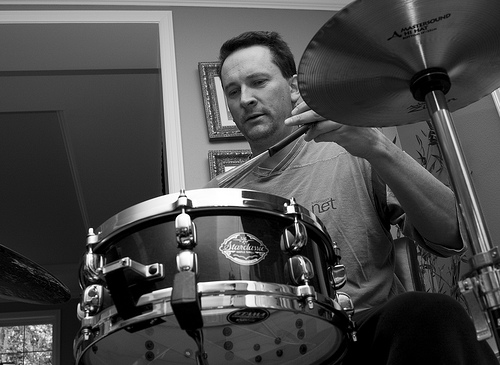Just like when you’re shopping for a new pair of sticks, there are a lot of factors that go into making a good pair of brushes that a non-drummer might not even think about. The shape, size, and material of the handle will affect both how comfortable the brushes are to play with and how well they hold up over repeated use.
Most players also prefer retractable brushes, both because they’re easier to keep in good repair for longer and because the varied lengths of wire offer you more sound options to play around with. If you’re in the market for a new set of brushes, check out the four models listed below. These are, in our humble opinion, the 4 best drum brushes on the market.
Regal Tip BR-584-W
These retractable brushes from the Regal Tip catalogue have a .6” diameter handle that’s wooden where you hold it and rubber where it holds the bristles, giving you the best of both worlds when it comes to comfort and control. They were designed by American jazz drummer Ed Thigpen to give the sound and touch you want from brushes in a modern jazz context.
The wire bristles have an adjustable spread, giving you even more control over your tone. Durable and well-balanced, the versatility of these brushes makes them perfect for the drummer who experiments with sound and style, while the length and weight give them a familiar old-school feel.
Vic Firth Heritage Brush
While some people prefer the feel of a wooden handle, smooth rubber handles like those on the Vic Firth Heritage Brushes can offer you a better grip, giving you the freedom to relax your grip and focus on the music. The retractable wires can be adjusted to give you a spread up to 6” wide, a wider spread than many models on the market that gives you more tone colors to work with.
The heavy-gauge wire won’t bend or break from wear and the construction of the handle is equally durable, adding up to a dependable brush that’s versatile enough to be your new go-to brushes. This should be on anyone’s list of the best drum brushes.
Zildjian Professional Wire Brush
The spread on these Zildjian brushes is narrower than some of the others on the list even when fully extended, giving you a softer, more delicate brush sound. The plastic handle has a flattened shape compared to many brushes on the market and it’s also a bit narrower at .55” in diameter. For many people this makes them more comfortable for longer playing sessions.
In terms of balance, the feel is similar to a classic 7A stick. Like the two models above, they’re fully adjustable for a range of widths and sounds, with a versatile medium-gauge wire that’s light enough for work on ballads but heavy enough to be heard in other contexts. The quality of the construction means the wires won’t come loose when you play at faster tempos.
Promark B600 Nylo-Brush
While most drum brushes use wire bristles, that’s not your only option when you’re looking for a professional brush. Nylon bristles, like the ones on these Promark brushes, won’t bend out of shape like metal bristles can do sometimes, and also won’t scratch your drumheads when you play with them.
While they tend to give you a softer, sweeter sound, you can get the same full dynamic range from nylon bristles as you can from steel wires once you get accustomed to the technique. If you use V-Drums or other delicate equipment, these Promark brushes will give you the soft touch you need without sacrificing anything on the sound. This is a strong contender for the best drum brush period.
Nylon vs. Wire
For a long time, wire brushes were the only option available for drummers, and are still the variety preferred by many players today. Wire brushes have the most traditional sound, with a bright tone that’s snappy when used to hit the drum and a sustaining swish when dragged across the head. Mastering the technique of using wire brushes can be tricky, though especially if you’ve never played with brushes before. The metal has also been known to damage drum heads made of softer materials, and over time can strip away the coating on certain styles of drum heads, leading you to have to change your heads more often.
In recent decades, more brushes have become available with nylon or plastic bristles in lieu of the traditional medal. These brushes tend to be a bit softer in both volume and presence, with a warmer tone and less sustain. Unlike wire brushes, they won’t damage even the most delicate drum head. Because they’re more flexible, they also tend to be more forgiving for beginners or those who haven’t had a lot of experience with brush technique.
While for most people the wire brushes will give you the sound you’re looking for, there are some situations where the nylon brushes are preferred. Certain styles of drum, like the V-drums mentioned above, cannot be used with metal brushes. Many professional drummers buy both wire and nylon brushes to give them a wider range of sound options.
Handle Materials of the Best Drum Brushes
The material used in the handle won’t affect the overall sound of the brush, but it will impact the durability of the brush and how comfortable it is to play. If you’ve only ever played with drumsticks, a wooden handle will feel more natural in your hand and will make it easier to pick up the right technique. Even models with a traditional rubber or plastic handle will have slightly different shapes and widths; if you’re not sure which one will feel most natural for you, try to pick something with a similar diameter to the drumsticks you use so it’s less of an adjustment.
Just because a brush uses a rubber or plastic handle doesn’t mean it’s poorly made. While plastic handles will occasionally crack if used with a lot of pressure, the durability of your brushes has more to do with the quality of the construction than the material used. Just like with sticks, though, brushes will naturally wear out over time, whether that means it loses bristles or the handle itself breaks.
Finding the right balance of durability and value is a matter of personal playing style. If you know you tend to use a lot of pressure when you play, buying a model with a wooden handle may save you some aggravation in the future and prevent you from having to buy new brushes as often.








